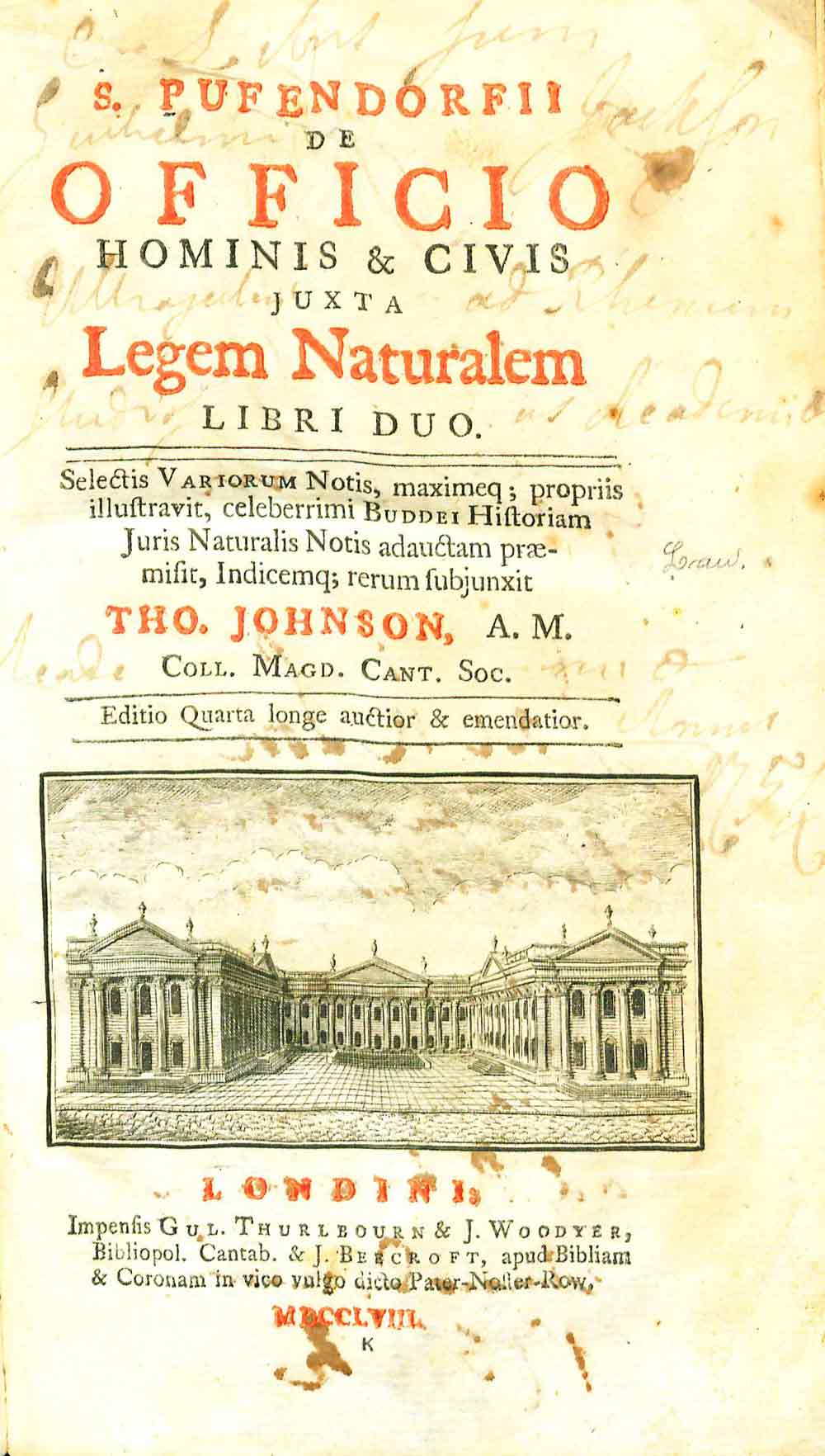De Officio Hominis & Civis Juxta Legem Naturalem
by Samuel Pufendorf
| S. Pufendorfii, De Officio Hominis & Civis Juxta Legem Naturalem Libri Duo: Selectis Variorum Notis, Maximeq; Propriis Illustravit... Buddei Historiam Juris Naturalis Notis Adauctam Præmisit, Indicemq | |
|
Title page from S. Pufendorfii, De Officio Hominis & Civis Juxta Legem Naturalem Libri Duo: Selectis Variorum Notis, Maximeq; Propriis Illustravit... Buddei Historiam Juris Naturalis Notis Adauctam Præmisit, Indicemq, George Wythe Collection, Wolf Law Library, College of William & Mary. | |
| Author | Samuel Pufendorf |
| Published | Londini: impensis G. Thurlbourn |
| Date | 1758 |
| Language | Latin |
| Volumes | 1 volume set |
Samuel Pufendorf (1632-1694), "[t]he most significant moral and political philosopher of late seventeenth- and early eighteenth-century Europe,"[1] was born in 1632 in Dorfchemnitz, Germany to a Saxton family of orthodox Lutherans.[2] Pufendorf's education began at home until, at the age of thirteen, he qualified for admission to the subsidized Fürstenschule at Grimma.[3] He followed this with study at the University of Leipzig and the University of Jena. Pufendorf developed his first main work, without the aid of books or manuscripts, while imprisoned during the war between Sweden and Denmark.[4] Entitled Elementa Jurisprudentiae Universalis and published in 1660, it "integrate[d] [Hugo] Grotius and Thomas Hobbes into a larger natural law synthesis" using "the 'mathematical' method of [Pufendorf's] Jena professor Er-hard Weigel."[5] From 1661 to 1668, Pufendorf served as professor of natural and international law in Heidelberg, then followed with the same position at the University of Lund, from 1668 to 1676.[6] At Heidelberg, Pufendorf focused on teaching the ideas of Grotious and Tacitus, building off of the ideas of the Elements.[7]
In 1672, Pufendorf published De Jure Naturae et Gentium (On the Law of Nature and of Nations), followed by De Officio Hominis & Civis Juxta Legem Naturalem (On the Duty of Man and Citizen According to Natural Law in 1673. The latter was a condensation of the former, "a landmark work that proposed a thorough system of private, public, and international law based on natural law. Beginning with a consideration of fundamental legal ideas and their various divisions, Pufendorf proceed[ed] to a discussion of the validity of customs, the doctrines of necessity and innate human reason ... Pufendorf argued that peace, not war, was the state of nature, and he proposed that international law was not restricted to Christendom."[8] Integral to Pufendorf's writing was the concept of a natural state. He deemed it so significant that he "considered political tracts which ignore[d] it 'gravely defective.'"[9] Pufendorf separated the law's injunctions, in accordance with the separations of the natural state, into three categories: (1) those toward God (adversus Deum), (2) those toward ourselves (adversus seipsum), and (3) those toward other humans (adversus alios homines).[10] De Officio Hominis & Civis Juxta Legem Naturalem was published continually and was translated into several different languages.[11] Pufendorf's work eventually became a staple of university education.[12]
Evidence for Inclusion in Wythe's Library
Description of the Wolf Law Library's copy
Bound in recent period-style quarter calf over marbled boards with raised bands, a lettering piece to the spine, and renewed endpapers. Title page with copperplate vignette is printed in red and black with attractive woodcut head and tail-pieces. Contains signature of early owner, William Jackson. Purchased from the Lawbook Exchange, Ltd.
View this book in William & Mary's online catalog.
References
- ↑ Encyclopedia of Ethics, s.v. "Pufendorf, Samuel Freiherr von (1632-1694)", accessed October 10, 2013.
- ↑ Ibid.
- ↑ Michael Seidler, "Pufendorf's Moral and Political Philosophy", The Stanford Encyclopedia of Philosophy (Spring 2013 Edition), Edward N. Zalta (ed.).
- ↑ Seidler, "Pufendorf's Moral and Political Philosophy."
- ↑ Encyclopedia of Ethics, s.v. "Pufendorf, Samuel Freiherr von (1632-1694)."
- ↑ Encyclopedia of Ethics, s.v. "Pufendorf, Samuel Freiherr von (1632-1694).
- ↑ Seidler, "Pufendorf's Moral and Political Philosophy."
- ↑ British Museum General Catalogue of Printed Books to 1955, compact ed. (New York: Readers Microprint Corporation, 1967), 20:1074.
- ↑ Ibid.
- ↑ Seidler, "Pufendorf's Moral and Political Philosophy."
- ↑ Ibid.
- ↑ Ibid.
